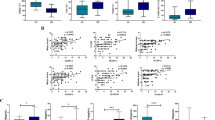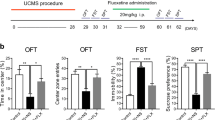Abstract
Background and Aims
Patients with inflammatory bowel disease (IBD) and concurrent depression are predisposed to severer disease activity and a worse prognosis. Macrophage polarization toward the M1 phenotype may contribute to the exacerbation of IBD with comorbid depression. Moreover, interferon regulatory factor 5 (IRF5) is involved in the pathogenesis of IBD. The aim of this study was to explore the role of IRF5 in macrophage polarization in the impact of depression upon colitis.
Methods
Depressive-like behavior was induced by repeated forced swim stress. Colon length, disease activity index (DAI), colon morphology, histology, ultrastructure of epithelial barrier, lamina propria macrophage polarization, and expression of IRF5 were compared between DSS colitis rats with and without depressive-like behavior. IRF5 shRNA was constructed to affect the rat peritoneal macrophages polarization in vitro. After IRF5 shRNA lentivirus was introduced into colon by enema, the colitis severity, lamina propria macrophage polarization, and TNF-α, IL-1β, and IL-10 of colon tissues were measured.
Results
The study found severer colonic inflammation in depressed versus non-depressed DSS-colitis rats. Depressed DSS-colitis rats exhibited smaller subepithelial macrophages size and reduced intracellular granule diversity compared with nondepressed DSS-colitis rats. Increased polarization toward the M1 phenotype, elevated expression of IRF5, and co-expression of IRF5 with CD86 were found in depressed versus nondepressed DSS-colitis rats. Lentivirus-mediated shRNA interference with IRF5 expression switched rat peritoneal macrophage polarization from the M1 to the M2 phenotype, downregulated TNF-α, IL-1β expression to a greater extent in depressed versus nondepressed colitis rats.
Conclusions
IRF5-mediated macrophage polarization may likely underlie the deterioration of DSS-induced colitis caused by depression.




Similar content being viewed by others
References
Byrne G, Rosenfeld G, Leung Y, et al. Prevalence of Anxiety and Depression in Patients with Inflammatory Bowel Disease. Canad J Gastroenterol Hepatol 2017;2017:6496727.
Loftus EV Jr, Guerin A, Yu AP, et al. Increased risks of developing anxiety and depression in young patients with Crohn’s disease. Am J Gastroenterol. 2011;106:1670–1677.
Navabi S, Gorrepati VS, Yadav S, et al. Influences and Impact of Anxiety and Depression in the Setting of Inflammatory Bowel Disease. Inflamm Bowel Dis 2018;24:2303–2308.
Ghia JE, Blennerhassett P, Deng Y, et al. Reactivation of inflammatory bowel disease in a mouse model of depression. Gastroenterology. 2009;136(7):2280-88.e1-4.
Frolkis AD, Vallerand IA, Shaheen AA, et al. Depression increases the risk of inflammatory bowel disease, which may be mitigated by the use of antidepressants in the treatment of depression. Gut 2019;68:1606–1612.
Varghese AK, Verdu EF, Bercik P, et al. Antidepressants attenuate increased susceptibility to colitis in a murine model of depression. Gastroenterology 2006;130:1743–1753.
Ghia JE, Park AJ, Blennerhassett P, et al. Adoptive transfer of macrophage from mice with depression-like behavior enhances susceptibility to colitis. Inflamm Bowel Dis 2011;17:1474–1489.
Nazimek K, Strobel S, Bryniarski P, et al. The role of macrophages in anti-inflammatory activity of antidepressant drugs. Immunobiology. 2017;222:823–830.
Tang Y, Zhao L, Lei N, et al. Crohn’s Disease Patients with Depression Exhibit Alterations in Monocyte/Macrophage Phenotype and Increased Proinflammatory Cytokine Production. Dig Dis (Basel, Switzerland). 2020;38:211–221.
Krausgruber T, Blazek K, Smallie T, et al. IRF5 promotes inflammatory macrophage polarization and TH1-TH17 responses. Nat Immunol 2011;12:231–238.
Khoyratty TE, Udalova IA. Diverse mechanisms of IRF5 action in inflammatory responses. Int J Biochem Cell Biol 2018;99:38–42.
Richez C, Yasuda K, Bonegio RG, et al. IFN regulatory factor 5 is required for disease development in the FcgammaRIIB-/-Yaa and FcgammaRIIB-/- mouse models of systemic lupus erythematosus. J Immunol (Baltimore, Md : 1950). 2010;184(2):796–806.
Dawidowicz K, Allanore Y, Guedj M, et al. The interferon regulatory factor 5 gene confers susceptibility to rheumatoid arthritis and influences its erosive phenotype. Ann Rheum Dis 2011;70:117–121.
Qi X, Lin W, Li J, et al. The depressive-like behaviors are correlated with decreased phosphorylation of mitogen-activated protein kinases in rat brain following chronic forced swim stress. Behav Brain Res 2006;175:233–240.
Kihara N, de la Fuente SG, Fujino K, et al. Vanilloid receptor-1 containing primary sensory neurones mediate dextran sulphate sodium induced colitis in rats. Gut. 2003;52:713–719.
Luo DD, An SC, Zhang X. Involvement of hippocampal serotonin and neuropeptide Y in depression induced by chronic unpredicted mild stress. Brain Res Bull 2008;77:8–12.
Wallace JL, MacNaughton WK, Morris GP, et al. Inhibition of leukotriene synthesis markedly accelerates healing in a rat model of inflammatory bowel disease. Gastroenterology. 1989;96:29–36.
Park S, Regmi SC, Park SY, et al. Protective effect of 7-O-succinyl macrolactin A against intestinal inflammation is mediated through PI3-kinase/Akt/mTOR and NF-κB signaling pathways. Eur J Pharmacol 2014;15:184–192.
Liu RH, Wen Y, Sun HY, et al. Abdominal paracentesis drainage ameliorates severe acute pancreatitis in rats by regulating the polarization of peritoneal macrophages. World J Gastroenterol. 2018;24:5131–5143.
Ghia JE, Blennerhassett P, Collins SM. Impaired parasympathetic function increases susceptibility to inflammatory bowel disease in a mouse model of depression. J Clin Investig 2008;118:2209–2218.
Zhu W, Yu J, Nie Y, et al. Disequilibrium of M1 and M2 macrophages correlates with the development of experimental inflammatory bowel diseases. Immunol Investig 2014;43:638–652.
Lin Y, Yang X, Yue W, et al. Chemerin aggravates DSS-induced colitis by suppressing M2 macrophage polarization. Cellular & molecular immunology. 2014;11:355–366.
Liu L, Liang L, Liang H, et al. Fusobacterium nucleatum Aggravates the Progression of Colitis by Regulating M1 Macrophage Polarization via AKT2 Pathway. Front Immunol 2019;10:1324.
Caradonna L, Amati L, Lella P, et al. Phagocytosis, killing, lymphocyte-mediated antibacterial activity, serum autoantibodies, and plasma endotoxins in inflammatory bowel disease. Am J Gastroenterol 2000;95:1495–1502.
Schoenemeyer A, Barnes BJ, Mancl ME, et al. The interferon regulatory factor, IRF5, is a central mediator of Toll-like receptor 7 signaling. J Biol Chem. 2005;280:17005–17012.
Weiss M, Blazek K, Byrne AJ, et al. IRF5 is a specific marker of inflammatory macrophages in vivo. Mediat Inflamm 2013;2013:245804.
Sun K, He SB, Qu JG, et al. IRF5 regulates lung macrophages M2 polarization during severe acute pancreatitis in vitro. World J Gastroenterol. 2016;22:9368–9377.
Wei Z, Yan L, Chen Y, et al. Mangiferin inhibits macrophage classical activation via downregulating interferon regulatory factor 5 expression. Mol Med Rep. 2016;14:1091–1098.
Yirmiya R, Rimmerman N, Reshef R. Depression as a Microglial Disease. Trends Neurosci. 2015;38:637–658.
Dinan TG, Cryan JF. Regulation of the stress response by the gut microbiota: Implications for psychoneuroendocrinology. Psychoneuroendocrinology. 2012;37(9):1369–78.
Carlessi AS, Borba LA, Zugno AI, et al. Gut microbiota-brain axis in depression: The role of neuroinflammation. Eur J Neurosci 2021;53:222–235.
Courties G, Heidt T, Sebas M, et al. In vivo silencing of the transcription factor IRF5 reprograms the macrophage phenotype and improves infarct healing. J Am Coll Cardiol. 2014;63:1556–1566.
Hall JL, Wei LN. Could silencing IRF5 improve healing of a myocardial infarct through the reprogramming of the macrophage population? J Am Coll Cardiol 2014;63:1567–1568.
Zhu D, Yang N, Liu YY, et al. M2 Macrophage Transplantation Ameliorates Cognitive Dysfunction in Amyloid-β-Treated Rats Through Regulation of Microglial Polarization. J Alzheimer's Dis. 2016 Mar 16;52(2):483–95.
Krausgruber T, Blazek K, Smallie T, et al. IRF5 promotes inflammatory macrophage polarization and TH1-TH17 responses. Nat Immunol. 2011;12(3):231–38.
Negishi H, Fujita Y, Yanai H, et al. Evidence for licensing of IFN-γ-induced IFN regulatory factor 1 transcription factor by MyD88 in Toll-like receptor-dependent gene induction program. Proc Natl Acad Sci. 2006;103(41):15136–41.
Acknowledgments
The authors thank the Core Facility of West China Hospital for experimental technical assistance. The authors also thank Li Li, Fei Chen and Chunjuan Bao from the Institute of Clinical Pathology, West China Hospital of Sichuan University, for processing histological staining.
Funding
This work was supported by Grants from National Natural Science Fund of China (No. 81770550) and 1·3·5 project for disciplines of excellence–Clinical Research Incubation Project, West China Hospital, Sichuan University (No. 2018HXFH054).
Author information
Authors and Affiliations
Contributions
CL performed most of the experiments and played a key role in preparing the manuscript; YT performed a significant part of the experiments. XG, NL, YL, PC collected the data and planned the study. SD, YC, YY interpreted data, and YZ was involved in project inception, design, supervision, and manuscript revision. All authors contributed to the article and approved the submitted version.
Corresponding author
Ethics declarations
Conflict of interest
The authors declare that the research was conducted in the absence of any commercial or financial relationships that could be construed as a potential conflict of interest.
Ethical approval
The animal study was reviewed and approved by the Animal Studies Committee of West China Hospital of Sichuan University.
Additional information
Publisher's Note
Springer Nature remains neutral with regard to jurisdictional claims in published maps and institutional affiliations.
Supplementary Information
Below is the link to the electronic supplementary material.
10620_2022_7679_MOESM1_ESM.tif
Supplementary Fig. 1. Effect of lentivirus-mediated shRNA-IRF5 interference on IRF5+ macrophages in the colonic mucosa and submucosa of rat. IRF5 shRNA treatment resulted in a dramatic down-regulation of IRF5 in CD68+ macrophages that infiltrated in the colonic mucosa and submucosa. Representative immunofluorescence images of colonic specimens for staining of IRF5 (green), CD68 (red) and DAPI (blue) (A). The lower three panels (magnification 400x, scale bar =20µm) showed the enlargement of the mucosa in the colon at the same section of the rectangular portion of the upper panel (magnification 50x, scale bar =200µm). The bar charts show the number ratios of IRF5+ and CD68+ co-expression cells, and positive cells were averaged in 10 randomly selected nonoverlapping high-power fields (B). A-B: n=4 rats per group. The data are presented as the mean ± SD. For all panels: *p<0.05, **p<0.01, ***p<0.001 by one-way ANOVA. Abbreviations: Control + NS, control rats with normal saline administered intrarectally; Control + NC-shRNA, control rats treated with NC-shRNA lentiviral vector; Control + IRF5-shRNA, control rats with intrarectal administration of IRF5-shRNA lentiviral (TIF 29296 kb)
Rights and permissions
Springer Nature or its licensor holds exclusive rights to this article under a publishing agreement with the author(s) or other rightsholder(s); author self-archiving of the accepted manuscript version of this article is solely governed by the terms of such publishing agreement and applicable law.
About this article
Cite this article
Liang, C., Tang, Y., Gao, X. et al. Depression Exacerbates Dextran Sulfate Sodium-Induced Colitis via IRF5-Mediated Macrophage Polarization. Dig Dis Sci 68, 1269–1279 (2023). https://doi.org/10.1007/s10620-022-07679-2
Received:
Accepted:
Published:
Issue Date:
DOI: https://doi.org/10.1007/s10620-022-07679-2




